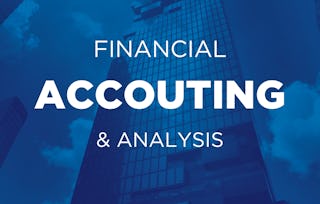Students are introduced to the field of financial accounting through defining the foundational activities, tools, and users of financial accounting. Students learn to use the accounting equation and are introduced to the four major financial statements. Additional topics include ethical considerations, recording business transactions, and the application of credit/debit rules.

What is Financial Accounting?

What is Financial Accounting?
This course is part of Introduction to Financial Accounting: The Accounting Cycle Specialization

Instructor: Andrea Eliassen
24,531 already enrolled
Included with
540 reviews
Skills you'll gain
- Bookkeeping
- Financial Statements
- Financial Reporting
- Balance Sheet
- Financial Accounting
- Income Statement
- Accounting
- Transaction Processing
- Business Ethics
- Ethical Standards And Conduct
- Accounting Records
- General Accounting
- Ledgers (Accounting)
- General Ledger
- Standard Accounting Practices
- Excel Formulas
- Microsoft Excel
- Accounting Systems
- Skills section collapsed. Showing 10 of 18 skills.
Details to know

Add to your LinkedIn profile
8 assignments
See how employees at top companies are mastering in-demand skills

Build your subject-matter expertise
- Learn new concepts from industry experts
- Gain a foundational understanding of a subject or tool
- Develop job-relevant skills with hands-on projects
- Earn a shareable career certificate

There are 4 modules in this course
Welcome to the first module of the course! We will start our introduction to the field of financial accounting by discussing practical applications of accounting information. Additionally we will identify who uses accounting information, address ethical considerations relevant to accounting, and define the three main forms of business ownership.
What's included
2 videos2 readings2 assignments
In this module we are introduced to the accounting equation and the four basic financial statements. We will start by breaking down the components of the accounting equation: assets, liabilities, and equity. We will then take a look at three out of the four basic financial statements: the income statement, the retained earnings statement, and the balance sheet. In this module's activity we will introduce you to the sum function in Excel, which will be used in the remaining activities for this course.
What's included
2 videos1 reading2 assignments
In this module we introduce the first step in the accounting cycle: “Analyze Transactions”. By the end of this module you will be able to analyze and record service business transactions within the fundamental accounting equation. First, we will walk through examples of recording business transitions in the video lesson. Then you will complete an activity to practice recording transactions on your own.
What's included
3 videos2 readings2 assignments
In this module we will analyze and record service business transactions using the debit and credit rules. We will also cover the function of T accounts within the accounting cycle and how to calculate the balances of each account at the end of an accounting period. In this module's activity you will have the opportunity to practice recording transactions in T accounts on your own in Excel.
What's included
3 videos2 readings2 assignments
Earn a career certificate
Add this credential to your LinkedIn profile, resume, or CV. Share it on social media and in your performance review.
Instructor

Offered by
Explore more from Business Essentials
 Status: Free Trial
Status: Free TrialUniversity of Pennsylvania
 Status: Free Trial
Status: Free TrialFundação Instituto de Administração
 Status: Free Trial
Status: Free TrialIESE Business School
 Status: Free Trial
Status: Free TrialUniversity of Virginia
Why people choose Coursera for their career

Felipe M.

Jennifer J.

Larry W.

Chaitanya A.
Learner reviews
- 5 stars
80.59%
- 4 stars
14.97%
- 3 stars
3.32%
- 2 stars
0.92%
- 1 star
0.18%
Showing 3 of 540
Reviewed on Aug 30, 2023
Not bad. Gave me the very basics that I was looking for. Tests were not much of a challenge. a textbook as part of the course would have made the course more college level.
Reviewed on Mar 12, 2025
EXCELLENT teacher. Schools that have online classes should take a page out of y'alls book!
Reviewed on Jul 24, 2021
The course was really interactive and interesting. The activities made the concept more easy to understand. The teaching style was also very interesting

Open new doors with Coursera Plus
Unlimited access to 10,000+ world-class courses, hands-on projects, and job-ready certificate programs - all included in your subscription
Advance your career with an online degree
Earn a degree from world-class universities - 100% online
Join over 3,400 global companies that choose Coursera for Business
Upskill your employees to excel in the digital economy
Frequently asked questions
To access the course materials, assignments and to earn a Certificate, you will need to purchase the Certificate experience when you enroll in a course. You can try a Free Trial instead, or apply for Financial Aid. The course may offer 'Full Course, No Certificate' instead. This option lets you see all course materials, submit required assessments, and get a final grade. This also means that you will not be able to purchase a Certificate experience.
When you enroll in the course, you get access to all of the courses in the Specialization, and you earn a certificate when you complete the work. Your electronic Certificate will be added to your Accomplishments page - from there, you can print your Certificate or add it to your LinkedIn profile.
Yes. In select learning programs, you can apply for financial aid or a scholarship if you can’t afford the enrollment fee. If fin aid or scholarship is available for your learning program selection, you’ll find a link to apply on the description page.
More questions
Financial aid available,

